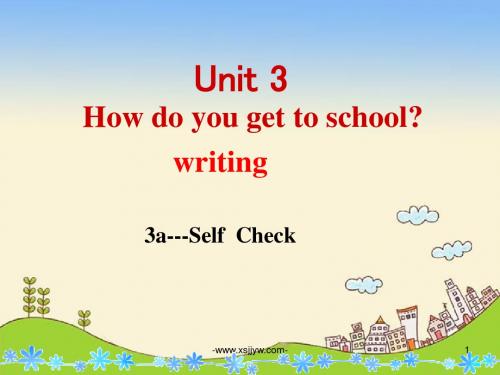英语写作手册-unit3PPT课件
合集下载
新人教英语七上unit3写作课演示文稿(共22张PPT)

15
为书面表达增光添彩 1.书写工整,注意标点,大小写。 2.注意人称。 3.尽量使用学过的词汇和句型,语言 通顺,表达要准确。
-wቤተ መጻሕፍቲ ባይዱ-
16
Have a try by yourselves!
自己试一试!
Who is the best writer? 谁是最好的作家?
school
-
8
20 minutes home school ---How long does it take you 乘(交通工具)上学花(某人) (多少)分钟。 ( to get from home to school ? ---It takes me 20 minutes It takes ____ about _____ minutes to go to to go to school by bike. school by/on ____. It takes sb some time to do sth
2
stage 1
words & phrases
词汇
-
3
交通工具 (动词类)
1.乘公共汽车 2.乘地铁 3.乘火车 4.坐小汽车 5.开车去
subway/ train car take the/a bus ___/___________/__
6.骑自行车 7.走路去
drive to
9
3a Read the e-mail from your pen pal Tom in the US. Fill in
the blanks with the words in the box.
-
10
fast-reading
get to leave walk
为书面表达增光添彩 1.书写工整,注意标点,大小写。 2.注意人称。 3.尽量使用学过的词汇和句型,语言 通顺,表达要准确。
-wቤተ መጻሕፍቲ ባይዱ-
16
Have a try by yourselves!
自己试一试!
Who is the best writer? 谁是最好的作家?
school
-
8
20 minutes home school ---How long does it take you 乘(交通工具)上学花(某人) (多少)分钟。 ( to get from home to school ? ---It takes me 20 minutes It takes ____ about _____ minutes to go to to go to school by bike. school by/on ____. It takes sb some time to do sth
2
stage 1
words & phrases
词汇
-
3
交通工具 (动词类)
1.乘公共汽车 2.乘地铁 3.乘火车 4.坐小汽车 5.开车去
subway/ train car take the/a bus ___/___________/__
6.骑自行车 7.走路去
drive to
9
3a Read the e-mail from your pen pal Tom in the US. Fill in
the blanks with the words in the box.
-
10
fast-reading
get to leave walk
人教8上Unit3 Writing写作精品课件(10张)

•
9.抓关键句法。关键句常常有暗示材 料中心 的作用 。所以 ,有些 新材料 作文材 料中的 关键性 语句可 以作为 选择立 意角度 的突破 口。在 新材料 作文的 材料中 ,关键 句常常 是命题 者或材 料中的 人物的 评议性 语句。
感谢观看,欢迎指导!
【鉴·典题考题】 请你比较一下你和你的好朋友Gina之间的异同, 可以从外貌、
性格、爱好及学习等方面进行比较。词数不少于80个。
体裁 时态 人称
要点
说明文 一般现在时 第一人称和第三人称 ①开篇点题引出比较对象 ②具体描述异 同点③表达自己的观点
【遣词造句】 1. 开篇点题引出比较对象 我有一个好朋友。 I have a good friend.
【参考范文】 Hi, Dave!
I am happy to say that I made a new friend a month ago. Her name is Liu Li. She is similar to me in some ways. We are both talented in music. Both of us like caring for others and we are both good listeners.
However, we also have some differences. My hair is longer than hers. Gina is more outgoing than me. And she likes going camping and going for vacations. I’m quiet. I don’t like going out. I like to read books. Gina is good at music and P. E. , but I do well in English and Chinese.
初中英语人教版八年级上册Unit3 Writing(共18张PPT)

3.Ending
My best friend
Peer-assessment (小组互评)
1. Look up more sayings about friends or friendship at home.
2. Read some passages about friends after school. Remember the sentences that you like and try to use them in your composition.
How to say similarities(相同点) and differences?
Similarities:
both too together as…as the same as
Differences:
taller than more outgoing but/however not as…as
谢谢观赏
You made my day!
我们,还在路上……
Who is my best friend?
My best friend is ... . She /He...
Let's make new friends! Wang Lingling
Liu Lili
3a Wang Lingling and Liu Lili are best
friends. Look at the chart and compare them.
reading but LiuLili likes sports . They are both popular and Wang Lingling is as outgoing as LiuLili. Wang Lingling is more serious , but Liu Lili is funnier. Wang Lingling is more hard-working, and Liu Lili is smarterthan Wang Lingling. They
My best friend
Peer-assessment (小组互评)
1. Look up more sayings about friends or friendship at home.
2. Read some passages about friends after school. Remember the sentences that you like and try to use them in your composition.
How to say similarities(相同点) and differences?
Similarities:
both too together as…as the same as
Differences:
taller than more outgoing but/however not as…as
谢谢观赏
You made my day!
我们,还在路上……
Who is my best friend?
My best friend is ... . She /He...
Let's make new friends! Wang Lingling
Liu Lili
3a Wang Lingling and Liu Lili are best
friends. Look at the chart and compare them.
reading but LiuLili likes sports . They are both popular and Wang Lingling is as outgoing as LiuLili. Wang Lingling is more serious , but Liu Lili is funnier. Wang Lingling is more hard-working, and Liu Lili is smarterthan Wang Lingling. They
unit3--My-Stroke-of-LuckPPT课件

.
13
• 我勇敢地爱你,如同为正义而奋争! • 爱你,以昔日的剧痛和童年的忠诚, • 爱你,以眼泪、笑声及全部的生命。 • 要是没有你,我的心就失去了圣贤, • 要是没有你,我的心就失去了激情。 • 假如上帝愿意,请为我作主和见证: • 在我死后,我必将爱你更深,更深!
.
14
Text analysis
The story is basically a piece of narrative writing, in which the account of the latest event is interrupted by a number of flashbacks (some earlier events and experiences). It begins with the air crash, then it goes back to what had happened before. After this the author resumes the narration of the air crash and subsequent events.
.
7
What is love?
• Love is a feeling./ Love is an attitude./ Love is an action./ Love is a choice./
• Enlarge your understanding./ Your
definition of love may be too narrow./ Love
.
5
Love phrase
• a young person's romantic love for someone, which other people do not think is serious Puppy love
六年级下册英语课件-Unit 3 写作方法指导 人教版 (共12张PPT)

多么快乐的一天啊!
小练笔:
根据提示写一则你星期天活动的日记。注意: 1. 日记的格式;2. 不少于50个单词。
6:30
7:30 上午 下午 晚上
起床,洗脸,吃早饭 洗衣服、 去操场 看电
打扫卫生
做作业 踢球 视
参考例文:
Sunday, June 13
Sunny
Today is Sunday. I got up at 6:30. Then I washed
译文:
星期一,6月1日
晴
今天是六月一日,儿童节。我有美好的一天。
上午我父母和我去了动物园。我看见了一些动物。
中午,我们去西餐厅享用了午餐,我在那得到了
许多可爱的玩具。我非常高兴。在下午两点左右,
我们来到了电影院。我们去看了《功夫熊猫2》。 哦,天哪!电影院里有好多孩子。电影太好笑了 以至于我笑了又笑。晚上,我看了动画片。
(3)句型: 主语+动词的过去式+其他. ③
第四步:通读检查。
范文: Monday, June 1st①
Sunny①
Today is June 1st, Children’s Day. I had a good day. In the morning② my parents and I went to the zoo. I saw some animals. At noon②, we went to a western
Unit 3 Where did you go?
PEP 六年级下册
四步法日记形式 描述一天的活动
题目:你的每一天都是不同的,有高兴的一天, 有糟糕的一天……请你以日记形式记录你 的一天。
四步法日记形式描述一天的活动
人教版八年级英语上册写作教程课件:Unit 3 (共36张PPT)

2. 内容要点——列一列,回答下列问题。
①What does a friend mean to you? ② Who is your best friend and what do you
写作相关的词块、句子。 名词/动名词词块:
①long straight hair, ②medium build, ③medium height, ④the most important thing, ⑤a true friend, ⑥primary school
Language box(语言工具箱)
(2)Patterns(句型)
Larry is quite different from ... ... if ... We both ... That's why ... ...as long as... ..., though… He work as hard as ...
2. Extensive languages(拓展性语言)
Where is she studying now? 5. In a college
Task3 好词好句
Good words and phrases from the passage
_______________________________ ________________________________
Yaoyao is a very talent girl. She loves reading, especially foreign short stories, by a very young age. She does very well in writing and deeply thinking due to a large quantity of reading. She had written her own short stories when she studied in Grade One. The language of her short stories is in her own style. There is deep thinking in the stories, too. When she completed one, I always would be the first reader.
七年级英语下册写作教程课件:Unit 3 The best way to school (共42张PPT)
very easy.
Task 2信息归纳:请阅读下面有关幸福的文章, 根据所提供的信息,完成下面表格。
Information Card The ways to get to sc.hool in the world
It depends on 1. _w_h_e_r_e_s_t_u_d_e_n_t_s_l_iv_e____________.
③分析文本的语言特征,思考有哪些语言可以灵活迁移 至自己的写作中,包括适切的词块、漂亮的句式等。
Language box(语言工具箱)
1.Unit topic languages(单元话题语言) 以连线、标序号等形式列举本单元与本话题写作
相关的词块、句子。
(1)Chunks(词块)
名词/动名词词块: ①the way to get to school , ②good exercise , ③more fun , ④a good choice , …
In North America
Most students go to school 2.__o_n__th_e__s_c_h_o_o_l_b_u_s______.
3._In__J_a_p_a_n_ Most students take the train to school .
In China
4._I_n_b_i_g_c_it_i_es__, students usually go to school by bus or by bike. In one village, it takes students more than 5._h_a_l_f _a_n_h_o_u_r_to get to school.
Task3 好词好句
Good words and phrases from the passage
Task 2信息归纳:请阅读下面有关幸福的文章, 根据所提供的信息,完成下面表格。
Information Card The ways to get to sc.hool in the world
It depends on 1. _w_h_e_r_e_s_t_u_d_e_n_t_s_l_iv_e____________.
③分析文本的语言特征,思考有哪些语言可以灵活迁移 至自己的写作中,包括适切的词块、漂亮的句式等。
Language box(语言工具箱)
1.Unit topic languages(单元话题语言) 以连线、标序号等形式列举本单元与本话题写作
相关的词块、句子。
(1)Chunks(词块)
名词/动名词词块: ①the way to get to school , ②good exercise , ③more fun , ④a good choice , …
In North America
Most students go to school 2.__o_n__th_e__s_c_h_o_o_l_b_u_s______.
3._In__J_a_p_a_n_ Most students take the train to school .
In China
4._I_n_b_i_g_c_it_i_es__, students usually go to school by bus or by bike. In one village, it takes students more than 5._h_a_l_f _a_n_h_o_u_r_to get to school.
Task3 好词好句
Good words and phrases from the passage
英语写作手册-unit3PPT课件
多用逗号,如:
• A. He said, “I have found the key.” • B. He said, “I think you and I should be friedns.”
2021/7/24
2
2. 说明语插在中间将直接引语分成 前后两部分
• 2.1 当直接引语的前一部分不能构成意思完整 的句子时, 说明语后用逗号, 如:
2021/7/24
5
练习
• “Is your cab available?” I asked when he finally looked up at me. He nodded, then said apologetically as I settled into the back seat, “I’m sorry, but I was reading a letter.” He sounded as if he had a cold or something. “I’m in no hurry,” I told him. “Go ahead and finish your letter.” He shook his head. “I’ve read it several times already. I guess I almost know it by heart.” “Letters from home always mean a lot,” I said. “At least they do with me because I’m on the road so much.” Then, estimating that he was 60 or 70 years old, I guessed,“From a child or maybe a grandchild?” “This isn’t family,” he replied. “Although,” he went on, “come to think of it, it might just as well have been family. Old Ed was my oldest friend. In fact, we used to call each other ‘Old Friend’ — when we’d meet, that is. I’m not much of a hand at writing.”
• A. He said, “I have found the key.” • B. He said, “I think you and I should be friedns.”
2021/7/24
2
2. 说明语插在中间将直接引语分成 前后两部分
• 2.1 当直接引语的前一部分不能构成意思完整 的句子时, 说明语后用逗号, 如:
2021/7/24
5
练习
• “Is your cab available?” I asked when he finally looked up at me. He nodded, then said apologetically as I settled into the back seat, “I’m sorry, but I was reading a letter.” He sounded as if he had a cold or something. “I’m in no hurry,” I told him. “Go ahead and finish your letter.” He shook his head. “I’ve read it several times already. I guess I almost know it by heart.” “Letters from home always mean a lot,” I said. “At least they do with me because I’m on the road so much.” Then, estimating that he was 60 or 70 years old, I guessed,“From a child or maybe a grandchild?” “This isn’t family,” he replied. “Although,” he went on, “come to think of it, it might just as well have been family. Old Ed was my oldest friend. In fact, we used to call each other ‘Old Friend’ — when we’d meet, that is. I’m not much of a hand at writing.”
实用职场英文写作教程Unit 3 Personal Statement25页PPT
从内容上讲,一篇好的个人陈述必须依次回答如下三个基本问题:你是什么样的人;你能给这份工作 职位带来什么益处;以及你对这份工作未来的目标是什么。除此之外,在有限的字数内,可适当添加 关于求职者自身的有价值的信息。 2. 从篇幅上看,一般个人陈述的字数应控制在50~150字以内,以100字左右为宜(可以的话使用1.5 倍行距,便于阅读)。一个好的个人陈述不仅要具备信息量,更要体现简明精炼,以显得申请者经过 慎重思考、概括写出的陈述,并非泛泛而谈。 3. 个人陈述中第一句话往往是最重要的。如果其内容并非雇佣者想要的,那么往往他们的阅读会戛 然而止。因此,必须好好利用第一句话的空间,以最有利的方式呈现出申请者的专业水准。 4. 关于个人陈述的人称使用,通常是第一人称“I”或者第三人称,也可以不出现人称代词或者人名, 因为阅读者知道所指是谁。切忌:①每句话都以人称代词“I”开头,给人以重复、繁冗、流水账的感 觉;②个人陈述中混杂使用第一人称和第三人称(实际上应该保持人称的一贯性)。 5. 在语言选择上,个人陈述的写作须注意如下三点:①避免使用口语化、俚语化等非正式语言;② 建议在介绍自己及个人职业经历经验时使用一些与专业、行业相关的术语,以显示求职者的专业知识 背景;③在描述自己能力、技能和个性时,所选择的形容词个数不必过多,1~3个为宜,且必须与所 申请的工作相关,最重要的是真实可信,切忌浮夸。 6. 由于篇幅不长,所需信息量大,具备良好的语言表达能力,组织好语言传达信息必然能体现申请 者的逻辑思维能力,因而,简单句或者短句在个人陈述中并不常见,建议求职者尽量使用逻辑性强的 复合句或者长句来写作。 7. 自己书写完毕后,反复阅读,再请亲戚、朋友或同学帮忙阅读,指出不完善之处。最终力求使得 个人陈述自然流畅,准确无误,不矫揉造作,不虚张夸大。
[课件]:Unit 3 writing
Internet
a flat screen
Please do the exercise in pairs and share your ideas with others.
Remember to say which computer you have chosen and give a reason.
be able to afford enough for the school so we had better look at the personal computers.
This one is very fast and uses discs which can store more information. Also it is neither too large nor too expensive. Let's see what it's made of. Why it's perfect! It's been made from
Writing on page 23
You may begin like this: Hello, everybody. My name is ________.
I’m a 321 model android, I work for the Li family….
You need to imagine what problems and delights this android might have to deal with. Putting yourself in someone else's shoes is a very important way of understanding how other people feel.
- 1、下载文档前请自行甄别文档内容的完整性,平台不提供额外的编辑、内容补充、找答案等附加服务。
- 2、"仅部分预览"的文档,不可在线预览部分如存在完整性等问题,可反馈申请退款(可完整预览的文档不适用该条件!)。
- 3、如文档侵犯您的权益,请联系客服反馈,我们会尽快为您处理(人工客服工作时间:9:00-18:30)。
• 当说明语在整个直接引语之后时,直接引 语句子的结尾用逗号,不用句号。如果直 接引语句子的结尾时句号或者是感叹号, 则不用逗号。
• a. “No body tells me anything,” said Mrs. Walsh.
• b. “Is it time to eat? ” She said. • c. “Oder, please!” shouted the chairman.
多用逗号,如: • A. He said, “I have found the key.” • B. He said, “I think you and I should be friedns.”
2
2. 说明语插在中间将直接引语分成 前后两部分
• 2.1 当直接引语的前一部分不能构成意思完整 的句子时, 说明语后用逗号, 如:
5
练习
• “Is your cab available?” I asked when he finally looked up at me. He nodded, then said apologetically as I settled into the back seat, “I’m sorry, but I was reading a letter.” He sounded as if he had a cold or something. “I’m in no hurry,” I told him. “Go ahead and finish your letter.” He shook his head. “I’ve read it several times already. I guess I almost know it by heart.” “Letters from home always mean a lot,” I said. “At least they do with me because I’m on the road so much.” Then, estimating that he was 60 or 70 years old, I guessed,“From a child or maybe a grandchild?” “This isn’t family,” he replied. “Although,” he went on, “come to think of it, it might just as well have been family. Old Ed was my oldest friend. In fact, we used to call each other ‘Old Friend’ — when we’d meet, that is. I’m not much of a hand at writing.”
• A. “ I haven’t been old,” he said, “ of the danger of skiing.:
• B. “ For your next project,” said the teacher, “ you will write an essay about the Blarney Stone.”
• 2.2 当直接引语的前一部分的结尾是一个句子 的末尾时, 说明语后用句号 直接引语的后一 部分的开头要大写, 如:
• A. “ I can’t believe it!” he exclaimed. “our house can’t have been burned down!”
3
3. 当说明语在整个直接引语之后
4
练习
• “Is your cab available?” I asked when he finally looked up at me. He nodded, then said apologetically as I settled into the back seat, “I’m sorry, but I was reading a letter.” He sounded as if he had a cold or something. “I’m in no hurry,” I told him. “Go ahead and finish your letter.” He shook his head. “I’ve read it several times already. I guess I almost know it by heart.” “Letters from home always mean a lot,” I said. “At least they do with me because I’m on the road so much.” Then, estimating that he was 60 or 70 years old, I guessed,“From a child or maybe a grandchild?” “This isn’t family,” he replied. “Although,” he went on, “come to think of it, it might just as well have been family. Old Ed was my oldest friend. In fact, we used to call each other ‘Old Friend’ — when we’d meet, that is. I’m not much of a hand at writing.”
直接引语标点符号的用法
• 1. 直接引语中, 逗号的用法 • 2. 直接引语中, 句号的用法 • 3. 直接引语中, 冒号的用法
1
1. 说明语在整个直接引语之前
1.1 直接引语只是一个词是,说明语后可不用 标点符号,直接引语也可不用引号,如:
• A. she cried out “What!” and ran for the bus. • B. What will you do if she says No? 1.2 直接引语是一个不长的句子时, 说明语后
• a. “No body tells me anything,” said Mrs. Walsh.
• b. “Is it time to eat? ” She said. • c. “Oder, please!” shouted the chairman.
多用逗号,如: • A. He said, “I have found the key.” • B. He said, “I think you and I should be friedns.”
2
2. 说明语插在中间将直接引语分成 前后两部分
• 2.1 当直接引语的前一部分不能构成意思完整 的句子时, 说明语后用逗号, 如:
5
练习
• “Is your cab available?” I asked when he finally looked up at me. He nodded, then said apologetically as I settled into the back seat, “I’m sorry, but I was reading a letter.” He sounded as if he had a cold or something. “I’m in no hurry,” I told him. “Go ahead and finish your letter.” He shook his head. “I’ve read it several times already. I guess I almost know it by heart.” “Letters from home always mean a lot,” I said. “At least they do with me because I’m on the road so much.” Then, estimating that he was 60 or 70 years old, I guessed,“From a child or maybe a grandchild?” “This isn’t family,” he replied. “Although,” he went on, “come to think of it, it might just as well have been family. Old Ed was my oldest friend. In fact, we used to call each other ‘Old Friend’ — when we’d meet, that is. I’m not much of a hand at writing.”
• A. “ I haven’t been old,” he said, “ of the danger of skiing.:
• B. “ For your next project,” said the teacher, “ you will write an essay about the Blarney Stone.”
• 2.2 当直接引语的前一部分的结尾是一个句子 的末尾时, 说明语后用句号 直接引语的后一 部分的开头要大写, 如:
• A. “ I can’t believe it!” he exclaimed. “our house can’t have been burned down!”
3
3. 当说明语在整个直接引语之后
4
练习
• “Is your cab available?” I asked when he finally looked up at me. He nodded, then said apologetically as I settled into the back seat, “I’m sorry, but I was reading a letter.” He sounded as if he had a cold or something. “I’m in no hurry,” I told him. “Go ahead and finish your letter.” He shook his head. “I’ve read it several times already. I guess I almost know it by heart.” “Letters from home always mean a lot,” I said. “At least they do with me because I’m on the road so much.” Then, estimating that he was 60 or 70 years old, I guessed,“From a child or maybe a grandchild?” “This isn’t family,” he replied. “Although,” he went on, “come to think of it, it might just as well have been family. Old Ed was my oldest friend. In fact, we used to call each other ‘Old Friend’ — when we’d meet, that is. I’m not much of a hand at writing.”
直接引语标点符号的用法
• 1. 直接引语中, 逗号的用法 • 2. 直接引语中, 句号的用法 • 3. 直接引语中, 冒号的用法
1
1. 说明语在整个直接引语之前
1.1 直接引语只是一个词是,说明语后可不用 标点符号,直接引语也可不用引号,如:
• A. she cried out “What!” and ran for the bus. • B. What will you do if she says No? 1.2 直接引语是一个不长的句子时, 说明语后
